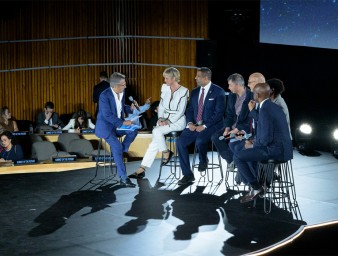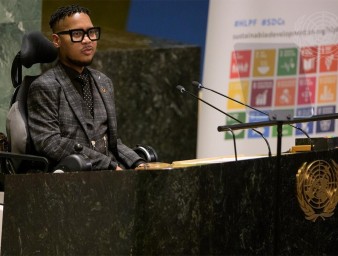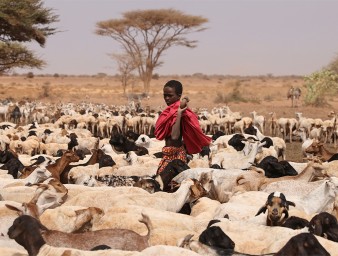Partnership brings the fire for human rights and the SDGs
27 June 2024

Lungile Magagula stands in the Eswatini Legal Aid Office booth, surrounded by pamphlets and booklets, holding conversations on how the laws help people to access justice and enjoy their human rights.
“We have different people coming through our stall and we explain to them our mandate, provide legal awareness information, what legal assistance, including representation, could look like,” said Magagula, who is the director of the Office.
Participants found the Eswatini Legal Aid Office and the numerous other booths like hers as they wandered through the “Bring Your Fire Zone” (BYFZ), in the Bushfire Festival, in Eswatini. The Zone was situated in such a way that people could wander through it or near it as they made their way from the camping sites for the weekend-long festival. Each person, each conversation is a chance for Magagula and others to remind people that their rights are important.
“I bring my fire for access to justice for all, that’s the most important thing you can do,” she said. “And you can never truly ensure that there’s access to justice unless people are actually aware of their legal rights. Unless people are aware of their rights, they can never be able to claim their rights to access justice.”
And each person through the zone demonstrated once again the successful partnership between the Bushfire Festival and the UN Country Team in Eswatini, said Laila Nazarali, UN Human Rights Office Advisor in Eswatini, showcasing its importance to all audience.
“It is important to OHCHR because it promotes building a constituency for human rights; it leverages partnerships for scaling up outreach and advocacy and it mainstreams human rights discourse with everyday issues as well as it provides an opportunity to shape the narrative on human rights,” she said. “For the UN, it is important because it enhances the UN’s visibility; it demonstrates the UN working as One UN. To the public, it dispels the myth that human rights are a foreign / Western concept, and that the UN is inaccessible.”
Bushfire Director Jiggs Thorne who founded the festival in 2007, said the zone was there to provide space for conversations and activism.
“
One of the principal environments where we achieve this is the UN Bring Your Fire Zone, which is a space for creative activism and again where we take on relevant themes in line with the SDGs
“
Jiggs Thorne, Founder & Director Bushfire Festival
Music + Activism = Perfect partnership
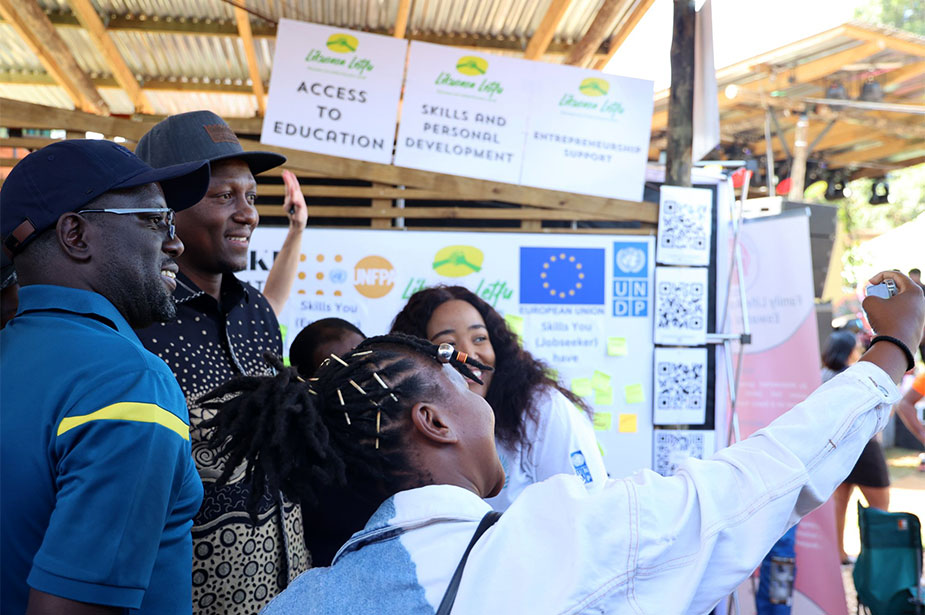
There was a great deal of interaction during the festival at the booths. © Reign Pot
MTN Bushfire 2024 was the second time that the UNCT partnered with Bushfire to help promote and advocate on a variety of human rights and development issues important to both the country and the region. The partnership started last year as part of the Human Rights 75 commemoration of the 75th anniversary of the Universal Declaration of Human Rights (UDHR). This year, the partnership continued, providing an opportunity for the UNCT to enhance its visibility, outreach, and opportunities for advocacy by raising awareness of sensitive human rights issues aligned to the sustainable development goals (SDGs), Nazarali said.
One of those issues was that of gender-based violence (GBV). Margaret Thwala-Tembe, Head of the Office for the UN Population Fund (UNFPA) Eswatini Country Office, said engagement at the BYFZ provided an opportunity for them to engage with a wide-ranging audience on key issues surrounding GBV.
“The dialogues with young people provided a good opportunity for discussions on issues of violence among young people,” she said.
Look who’s talking
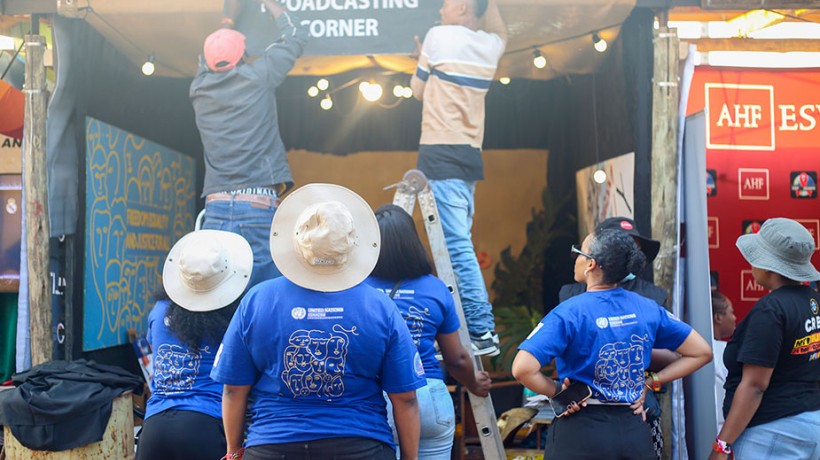
The festival featured Broadcast Corner, a spot where musicians, activists, NGOs and even government officials, took time to chat about what burning issues they were “bringing their fire for.” © Reign Pot
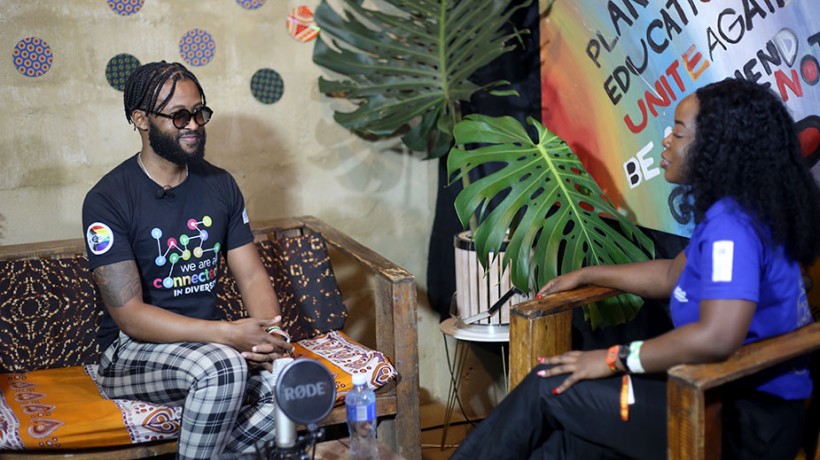
The festival featured Broadcast Corner, a spot where musicians, activists, NGOs and even government officials, took time to chat about what burning issues they were “bringing their fire for.” © Reign Pot
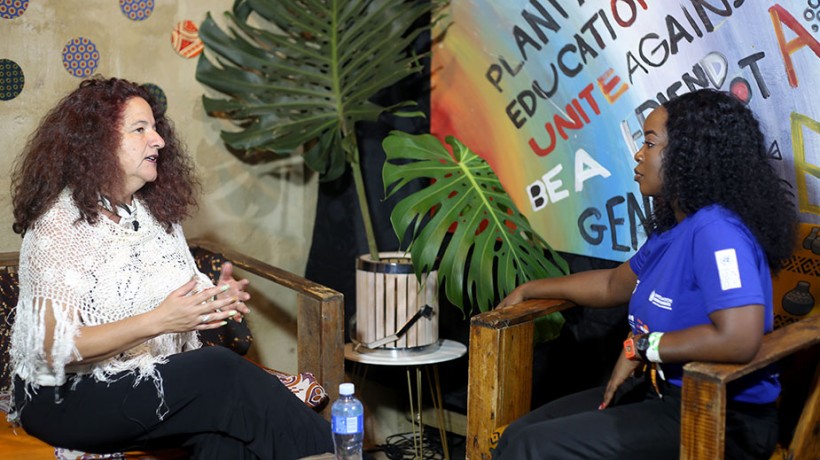
The festival featured Broadcast Corner, a spot where musicians, activists, NGOs and even government officials, took time to chat about what burning issues they were “bringing their fire for.” © Reign Pot
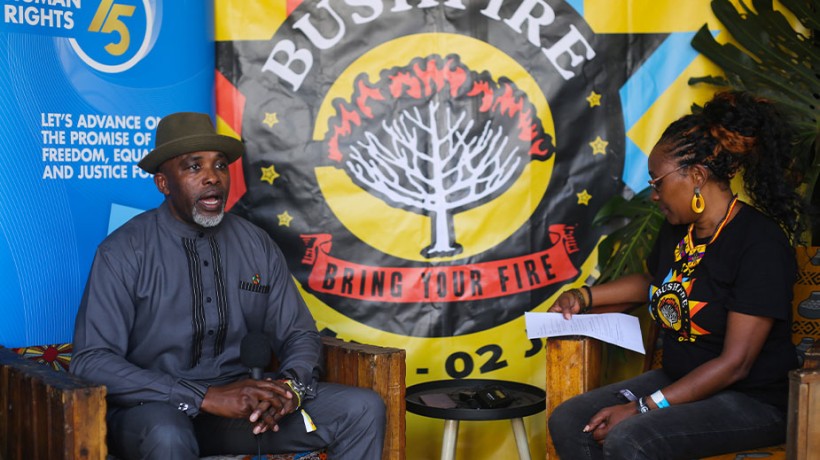
The festival featured Broadcast Corner, a spot where musicians, activists, NGOs and even government officials, took time to chat about what burning issues they were “bringing their fire for.” © Reign Pot
The BYFZ also received high level visitors this year. Eswatini Prime Minister Russell Dlamini walked around the zone, interacting with vendors and social activists before sitting down for a short interview in the UN Human Rights sponsored broadcast-corner. During the interview, he said he appreciated what the festival does for the country – including putting it on the regional and global map and bringing financial resources into the country – boosting the economy and every sector.
“What I’ve just seen right now is how critical information is also being distributed and shared,” he said. “You know, to the people who are here, it is good that they are able to learn leisurely and we appreciate that.”
The partnership encompassed not just the weekend festival, but weeks before and after. Before the festival, several live dialogues on thematic issues were held at House on Fire, bringing in students, giving them space to talk about some sensitive issues, said Nazarali. For example, dialogues dealt with youth employability, food security, education, climate action, peace, justice and strong institutions, human trafficking, HIV/AIDS, GBV, inclusion of marginalised key populations, including LGBTQI+.
“It provided a space and platform (through the live dialogues and the Bring Your Fire Zone) to amplify human rights and highlight sensitive issues especially in the Eswatini context, where GBV is still taboo, abortion is illegal, in a context where LGBTQI + is also taboo,” she said. “It moves the needle forward on human rights in a challenging country context like Eswatini where civic space is shrinking.”
Bongile Khanya, an assistant head of the Bring Your Fire Zone department with the festival, called the partnership a natural fit.
“I think that the partnership has actually emphasized what the Bushfire festival has been about, which is about social activism, to be able to address issues that we're faced with in terms of our social environment,” she said. “So, it's not just about a big festival, but it's about driving social change and social activism. I think the partnership with the UN legitimized this.”
Bring your fire
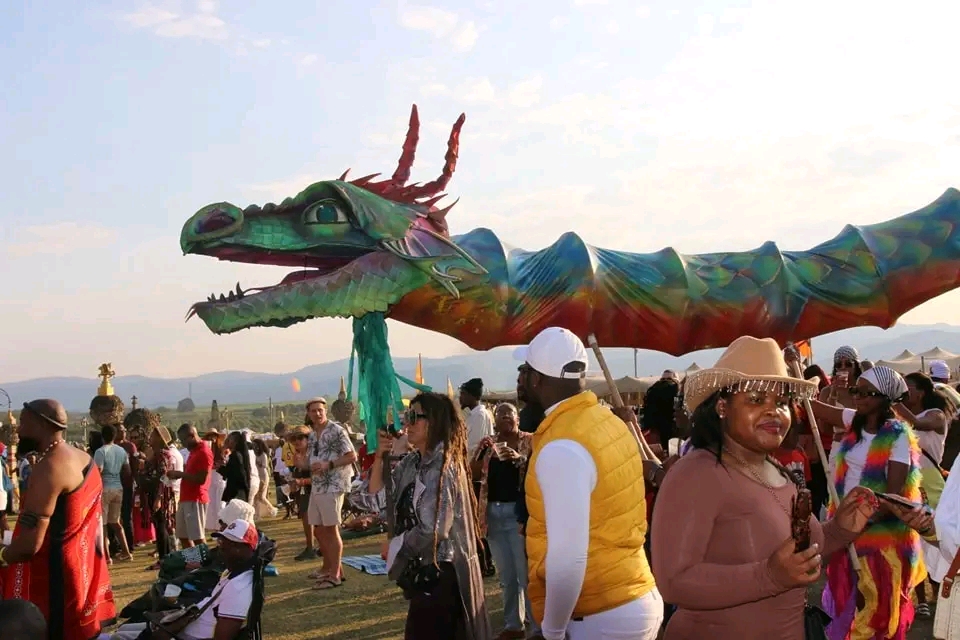
A dragon formed part of the Unity Parade, highlighting diversity of all communities, during the Bushfire Festival. © Reign Pot
The clarion call of the festival is “bring your fire” and for many participants, both NGOs, UN and others, the answers were varied.
Mncedisi Dlamni is from Young Heroes, an NGO that works with orphaned and vulnerable children in Eswatini. The group is one of the beneficiaries of Bushfire’s partnership programme for the last 16 years. This year, they have been able to use the funding they receive to provide more access to job opportunities and training for young people, he said.

Human rights in the round: Festival participants had a chance to show their support for the SDGs at the 360-degree turntable selfie booth. © Reign Pot

Two festivalgoers show their support for SDG 16, on peace, justice and strong institutions. © Reign Pot

Young people have led the charge on climate action. A young festivalgoer shows his support for SDG 13 on climate action. © Reign Pot
Melusi Matsenjwa works with the Eswatini Council of Churches, one of the NGOs with a booth at the festival. He said the partnership with the UNCT was a natural relationship because it gave them the chance to speak to a wide variety of audiences from across Africa as well Europe. Their focus was to make sure that people understood what the church does in terms of human rights, specifically – especially in terms of offering legal aid.
“We think it’s a beautiful space where we can reach, particularly the middle class, because the programmes we do are for the grassroots,” he said. “And this is a captive audience, so that’s why we are here.”

UN Human Rights gets the star treatment, as the logo is projected on the LED screen in the Bring Your Fire Zone of the Bushfire Festival. © Reign Pot
